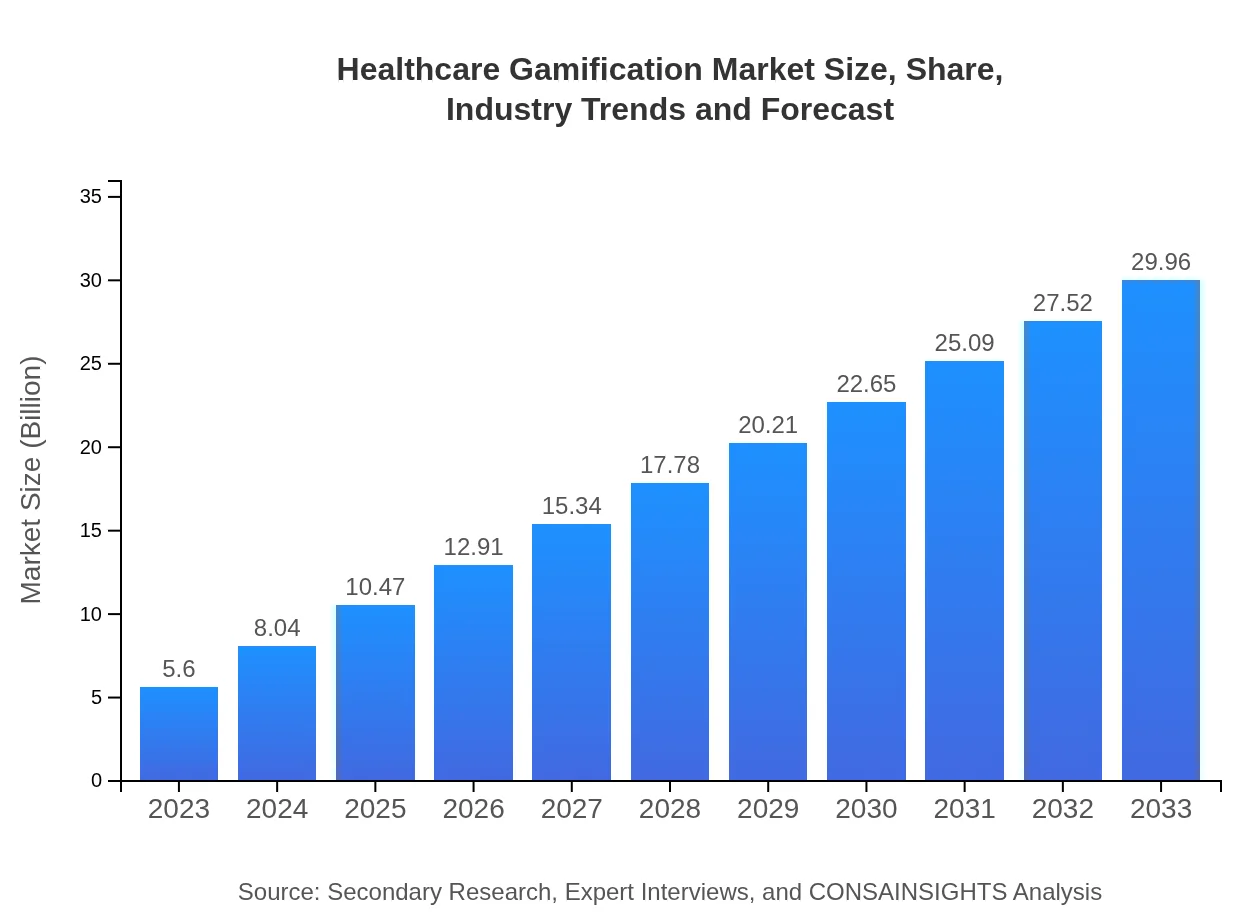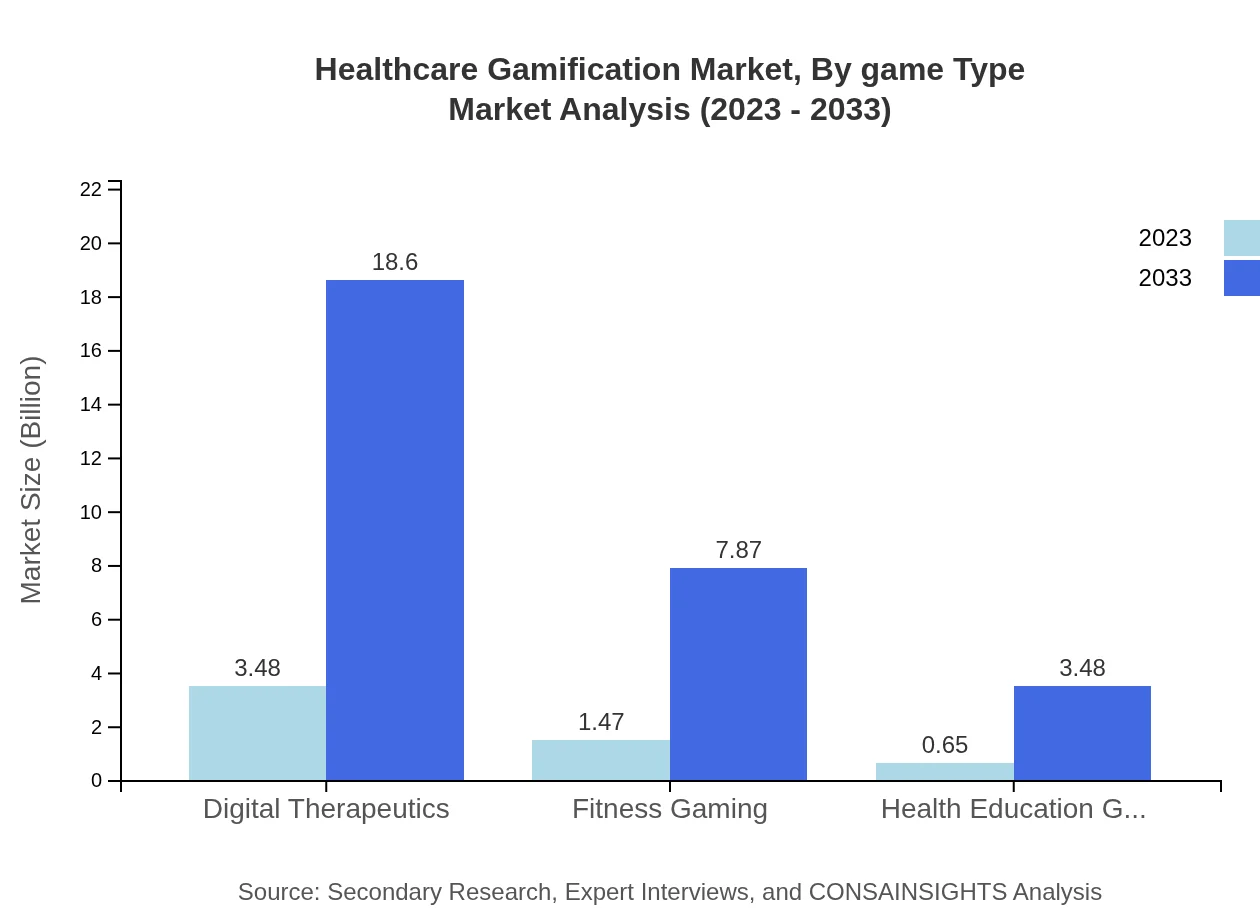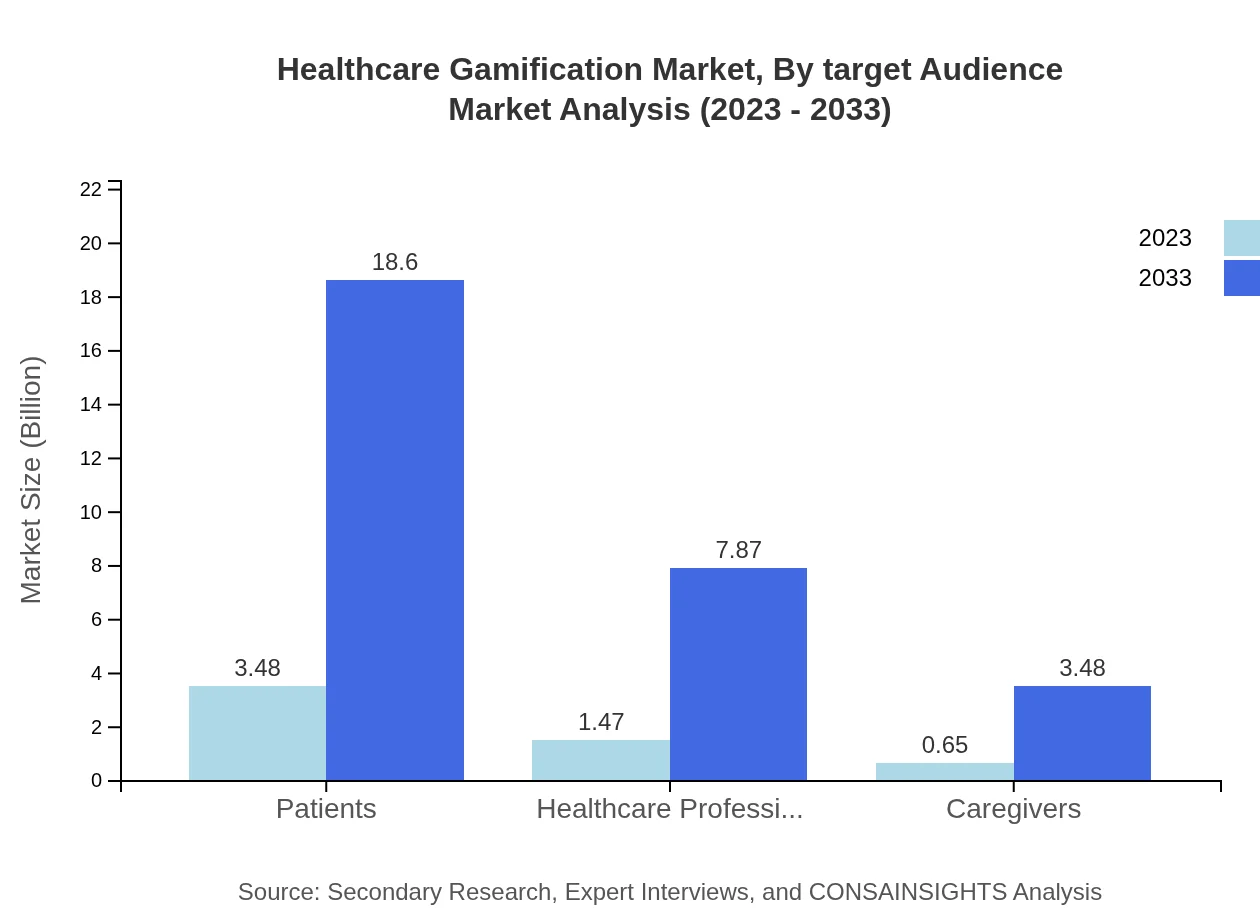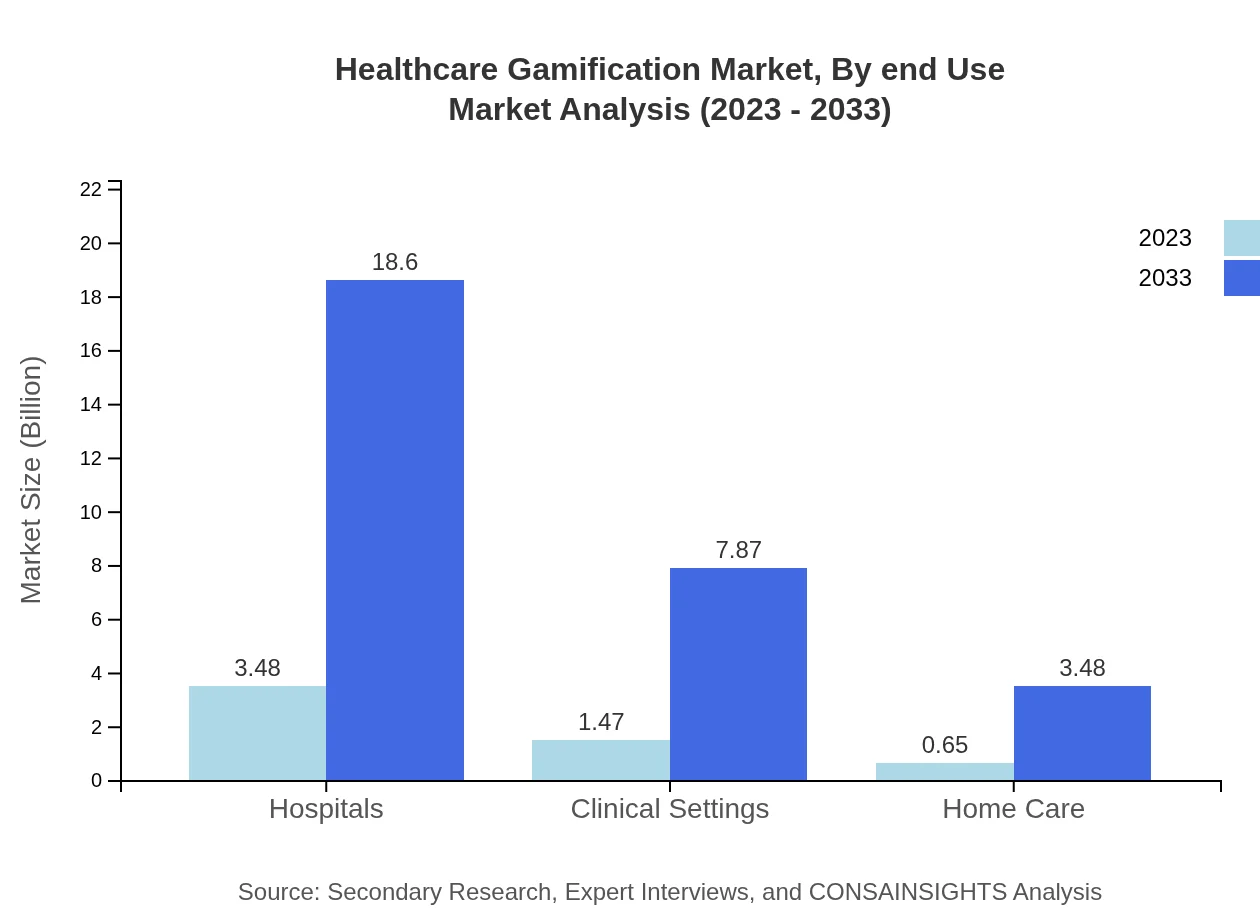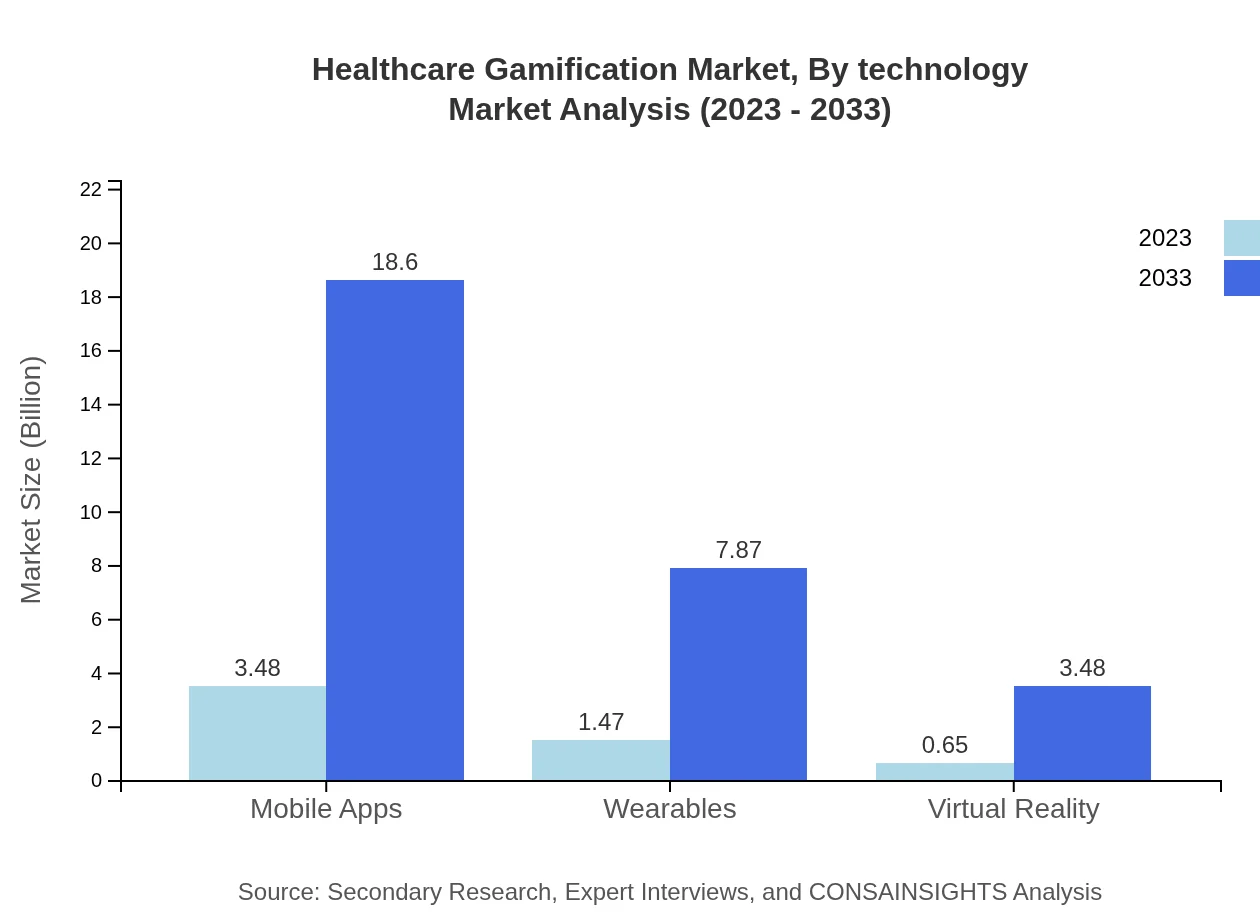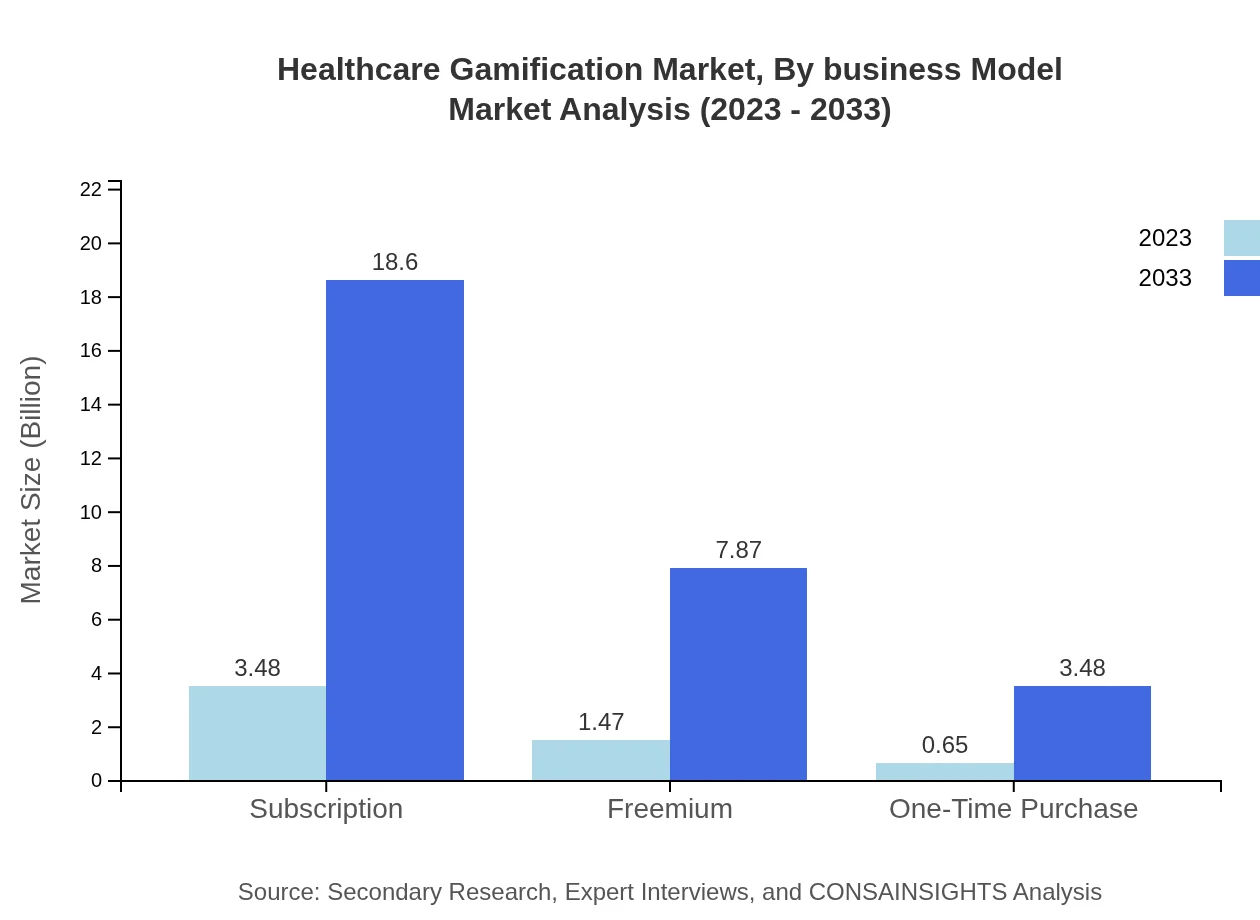Healthcare Gamification Market Report
Published Date: 31 January 2026 | Report Code: healthcare-gamification
Healthcare Gamification Market Size, Share, Industry Trends and Forecast to 2033
This report provides an in-depth analysis of the Healthcare Gamification market from 2023 to 2033, including insights on market size, growth factors, segmentation, regional analysis, and key trends shaping the industry.
| Metric | Value |
|---|---|
| Study Period | 2023 - 2033 |
| 2023 Market Size | $5.60 Billion |
| CAGR (2023-2033) | 17.3% |
| 2033 Market Size | $29.96 Billion |
| Top Companies | MySugr, Gamification Inc., Fitbit Health Solutions, Zombies, Run! |
| Last Modified Date | 31 January 2026 |
Healthcare Gamification Market Overview
Customize Healthcare Gamification Market Report market research report
- ✔ Get in-depth analysis of Healthcare Gamification market size, growth, and forecasts.
- ✔ Understand Healthcare Gamification's regional dynamics and industry-specific trends.
- ✔ Identify potential applications, end-user demand, and growth segments in Healthcare Gamification
What is the Market Size & CAGR of Healthcare Gamification market in 2023?
Healthcare Gamification Industry Analysis
Healthcare Gamification Market Segmentation and Scope
Tell us your focus area and get a customized research report.
Healthcare Gamification Market Analysis Report by Region
Europe Healthcare Gamification Market Report:
The European Healthcare Gamification market stands at $1.63 billion in 2023, projected to grow to $8.70 billion by 2033. Growth drivers include increased regulatory support for digital health initiatives and heightened awareness of chronic disease prevention. Furthermore, collaborations among healthcare providers and tech developers are fostering innovation and expansion in this region.Asia Pacific Healthcare Gamification Market Report:
In 2023, the Healthcare Gamification market in the Asia Pacific region is valued at approximately $1.06 billion, with projections of reaching $5.69 billion by 2033. The region is witnessing considerable traction due to an increase in smartphone penetration and the development of mobile health applications. Additionally, government initiatives promoting digital health technologies play a significant role in accelerating market growth.North America Healthcare Gamification Market Report:
North America is the dominant region in the Healthcare Gamification market, with a valuation of $2.12 billion in 2023 and expected growth to $11.35 billion by 2033. Factors driving this robust growth include high levels of technology adoption, significant investments in healthcare IT, and a burgeoning interest in patient engagement solutions. The presence of key players in this region further boosts market potential.South America Healthcare Gamification Market Report:
The Healthcare Gamification market in South America was valued at around $0.48 billion in 2023, anticipated to reach $2.58 billion by 2033. The market is propelled by a growing focus on improving healthcare infrastructure and the rising adoption of mHealth solutions among urban populations. Moreover, awareness campaigns promoting healthy lifestyles are contributing to market expansion.Middle East & Africa Healthcare Gamification Market Report:
In the Middle East and Africa, the Healthcare Gamification market is estimated at $0.31 billion in 2023, with expectations to reach $1.64 billion by 2033. Key factors include increasing investment in healthcare technology and a rising demand for personalized healthcare solutions, particularly in urbanized regions.Tell us your focus area and get a customized research report.
Healthcare Gamification Market Analysis By Game Type
This segment includes various game types contributing to the market, such as Digital Therapeutics, Fitness Gaming, Health Education Games, and Mobile Apps. Digital Therapeutics and Fitness Gaming represent the largest shares, with an estimated market size of $3.48 billion and $1.47 billion in 2023, respectively. The continual engagement offered through these mediums is vital for promoting health awareness and intervention strategies.
Healthcare Gamification Market Analysis By Target Audience
The market targets different user segments including Patients, Healthcare Professionals, and Caregivers. Patients dominate the market share, accounting for 62.1% of the total revenue in 2023, followed by Healthcare Professionals at 26.28%. These segments emphasize the importance of tailoring gamified solutions to enhance user engagement effectively.
Healthcare Gamification Market Analysis By End Use
The end-use segment includes Hospitals, Clinical Settings, and Home Care. Hospitals represent a significant share, contributing to almost 62.1% of healthcare gamification revenues in 2023. As healthcare firms increasingly adopt gamified systems, enhancing healthcare delivery through engaging options is paramount for better patient outcomes.
Healthcare Gamification Market Analysis By Technology
Focusing on the technologies utilized for gamification, the market includes conventional apps, mobile, wearables, and Virtual Reality. Mobile Apps are forecasted to continue leading the space, representing $3.48 billion in 2023 and a significant factor in user engagement and chronic disease management.
Healthcare Gamification Market Analysis By Business Model
The market is segmented based on business models including Subscription, Freemium, and One-Time Purchases. Subscription models are crucial, maintaining a strong position by capturing ongoing revenues and keeping users engaged over time. It represented 62.1% of the market share in 2023.
Healthcare Gamification Market Trends and Future Forecast
Tell us your focus area and get a customized research report.
Global Market Leaders and Top Companies in Healthcare Gamification Industry
MySugr:
MySugr specializes in digital diabetes management applications. They use gamification principles to enhance patient engagement and improve health outcomes for individuals managing diabetes.Gamification Inc.:
A leader in the gamification space, they provide solutions that help companies integrate gaming techniques into their applications, focusing on health, fitness, and wellness.Fitbit Health Solutions:
Known for their fitness trackers, Fitbit leverages gamification by providing rewards and challenges to improve health awareness among patients and users.Zombies, Run!:
This unique app combines gaming elements with physical activity, transforming running into an adventure game that encourages users to stay fit.We're grateful to work with incredible clients.









FAQs
What is the market size of healthcare Gamification?
In 2023, the healthcare gamification market size is approximately $5.6 billion. It is projected to grow at a compound annual growth rate (CAGR) of 17.3%, indicating robust growth towards enhancing engagement in health management.
What are the key market players or companies in the healthcare Gamification industry?
Key players in the healthcare gamification market include companies specializing in digital health solutions, mobile app development, and patient engagement platforms. These companies lead innovation in deploying gamified applications for better health outcomes in various settings.
What are the primary factors driving the growth in the healthcare Gamification industry?
Factors driving growth include increasing demand for patient engagement and education, advancements in technology, rising chronic diseases, and a growing focus on health and wellness. Gamification caters to enhancing adherence and satisfaction in healthcare services.
Which region is the fastest Growing in the healthcare Gamification?
The fastest-growing region in healthcare gamification is North America, projected to expand from $2.12 billion in 2023 to $11.35 billion by 2033. This region leads in innovation and adoption of digital health technologies.
Does ConsaInsights provide customized market report data for the healthcare Gamification industry?
Yes, ConsaInsights offers customized market report data tailored to specific needs in the healthcare-gamification industry. Clients can request insights that align closely with their strategic goals, market dynamics, and competitive landscape.
What deliverables can I expect from this healthcare Gamification market research project?
Clients can expect comprehensive deliverables such as detailed market analysis, segmentation data, competitive landscape, trends, regional insights, and growth forecasts, providing a well-rounded understanding of the healthcare gamification market.
What are the market trends of healthcare Gamification?
Current market trends include increasing integration of AI in gamification platforms, use of wearables for real-time feedback, rise in mobile health applications, and gamified approaches to chronic disease management, enhancing user engagement and outcomes.

